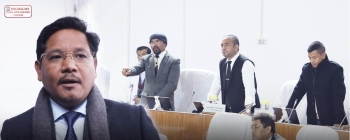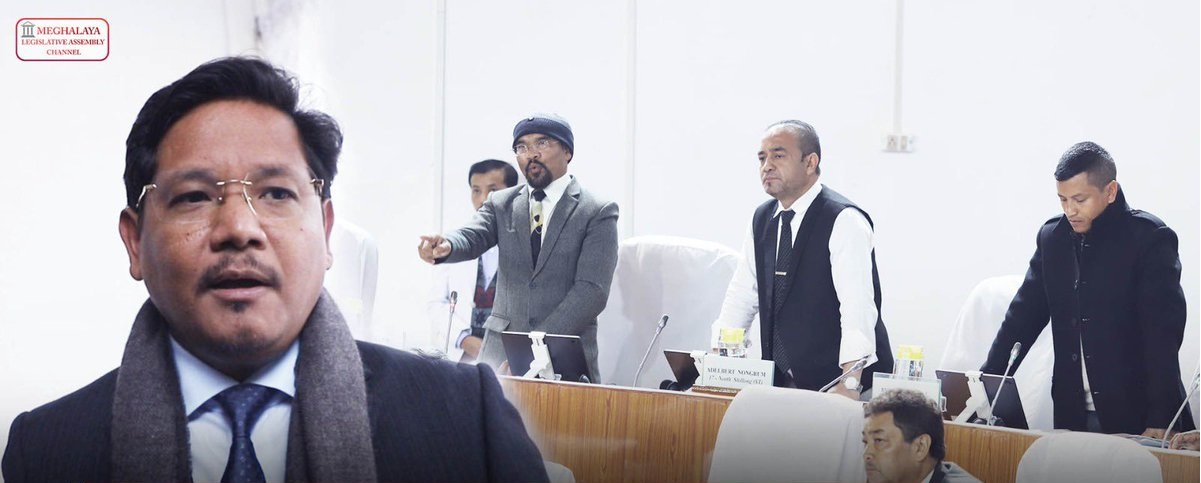
.png) Albert Thyrniang
Albert Thyrniang

The Governor’s address in Hindi in the Meghalaya Assembly on March 20 was marked by protests and walk-out by one of the opposition parties, the Voice of the People’ Party (VPP). Formed only in 2021, the VPP, in its election debut, won four seats in the Assembly polls held recently.
No sooner had the Governor, Phagu Chauhan, began his speech he was met with interruptions by the VPP’s supremo Ardent Miller Basaiawmoit. Quoting rule 20 of the rule and conduct of business he told the Governor that the conduct of business in the House should be in English. Appealing to all members, irrespective of party affiliation, he said the House should stand united as Meghalaya came into being because Assam started to impose Assamese as an official language.
Permitted by the Speaker, the Governor continued his speech in Hindi. Basaiawmoit began to shout slogans like “We condemn the Governor; we will not accept this; Meghalaya is not a Hindi speaking state; we cannot allow the government of India to impose on us the language we don’t understand; we will not allow this to become a tradition.”
The Chief Minister, Conrad Sangma, intervened to say that the behaviour of the member was not acceptable as the rule provides for a member to speak one’s mother tongue provided provisions are met. In this case, the English text was distributed to all members.
Assuring that no precedent is being set, he informed that the Governor can’t read English and he has to address in Hindi out of compulsion. He appealed that the Governor be respected. Throughout the intervention of the Chief Minister, slogan-shouting continued.
When the speech finally resumed in Hindi, the agitated member along with three of his MLAs staged a walkout saying, “The people of the state are insulted; they are sending Governors to Meghalaya who don’t speak English. We are boycotting the proceeding.”
This incident has once again sparked the debate on imposition of Hindi throughout the country. In Meghalaya, this is not the first that a Governor has addressed the Assembly in Hindi. The then Governor, Ganga Prasad, was the first to do so in 2018. Then too there were protests. A legislator, Ampareen Lyngdoh, and a couple of MLAs in the Opposition reacted by speaking in their mother tongues in the House though there was no such provision.
In spite of knowing that the official language in Meghalaya is English, not Hindi, and that the people of the state don’t understand Hindi, the Central government continues to appoint Governors who can’t even read English. Clearly there is an agenda to impose Hindi in Meghalaya. Certainly, there are many who speak English who can be appointed Governor in the state.
The present Governor was apparently appointed intentionally so that under the pretext that he does not read English, his speech in the Assembly will be in Hindi. A precedent will be set. A tradition will be created. The use of Hindi will, therefore, be normalised inside and outside the house. This is the design. The intention is a suspect.
The Central government is disrespecting the people of Meghalaya. The role and function of the Governor is not limited to just reading the written text in the Legislative Assembly. The Governor attends many functions. If his speech is not understood by anyone, then his presence is futile. He also interacts with the public. If people and the Governor don’t understand each other, the latter will be ineffective.
All languages, including Hindi, are respected. Here the issue goes far beyond respecting a language. Will memoranda, for example, have to be in Hindi? Or will the English memos be first translated into Hindi for the Governor alone? How practical is that? In Meghalaya there are three autonomous district councils (ADCs): The Jaintia Hills Autonomous District Council (JHADC), Khasi Hills Autonomous District Council (KHADC) and the Garo Hills Autonomous District Council (GHADC). Their Bills require the Governor’s assent. Now should the Bills be first made available in Hindi? Is that realistic?
Will the Legislative Assembly’s Bills also be first translated into Hindi for the sake of the Governor alone? It is time consuming, if not impossible. All the ADCs’ and state government’s Bills will lapse in Raj Bhavan. This is an utter disrespect to the state of Meghalaya. It is mandatory for Meghalaya’s Governor to know English if the titular head wants to serve the state.
There are those who opine that use of Hindi in the Assembly is harmless since it is one of the 22 official languages in India. But does it mean that any of those 22 languages can be used in Meghalaya Assembly? Tomorrow a Governor may insist that he or she addresses in Bengali in the House because he or she doesn’t read English. Others may demand for Assamese or Tamil or Malayalam or Guajarati or Urdu or any other language in the official list.
Protests and boycotts will surely take place not because MLAs hate these languages but simply because they don’t understand them. You may retort that these languages are not official languages in Meghalaya. Hindi too is not an official language here. Hindi has no primacy over other languages. Hindi and English are both official languages in India. And in Meghalaya English is the official language. English has to be used here by Governors.
The Chief Minister’s staunch defence of the Governor is understandable given his closeness with the BJP and its top leaders. His justification that Hindi be respected must be pleasing to the ears of the Sangh Parivar. It is the BJP’s ideologue, the RSS and other Hindutva groups which are pushing for the imposition of Hindi all over the country. They are pursuing the theory of one nation, one language, one culture, one religion and one law.
As his government has the blessing of the BJP, the Chief Minister is compelled to stand by the Governor. But there are instances where Chief Minsters publicly disagree with Governors if needed. In January this year in Tamil Nadu, the Chief Minister, M. K. Stalin, moved a resolution in the House in the presence of the Governor, R. N. Ravi, for skipping the mention of DMK’s founder, Periyar, Ambedkar and two former CMs.
The unprecedented incident saw the Governor walking out of the House. In November last year, Mizoram Chief Minister Pu Zoramthanga wrote to Union Home Minster Amit Shah to transfer the chief secretary Renu Sharma because MLAs don’t understand Hindi and some have difficulty with English. This is an extreme, but when it relates to the pride of the state even a public spat with the Governor or the Centre is not shied away.
If a Governor addresses the Tamil Nadu Assembly in Hindi surely unruly scenes will be witnessed. We may not agree with the antics of the VPP but we know well that the government takes notice only when such things are displayed. The Central Government has not noted the democratic protests in 2018. Before it is too late, a stronger opposition has to be demonstrated.
The stand of the VPP received a massive support from the public. It is surprising that local parties said nothing. This is because they have surrendered to the largest party, the NPP, that is heading the government. In his sound bite, a UDP minister, Paul Lyngdoh, acknowledged his preference of English over Hindi. However, he trivialised the issue saying he would demand for the appointment of an English-speaking Governor only if he was elected an MP.
The content of the speech of the Governor was completely lost in the pandemonium over Hindi. No one discussed the policies of the new government, highlighted in the Governor’s address. This is the price we pay because of the insensitive government.